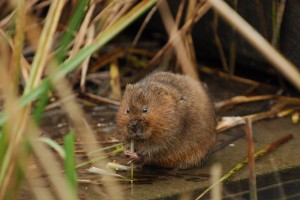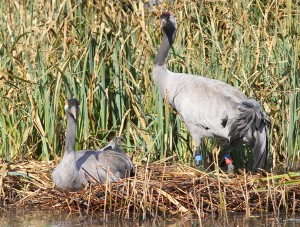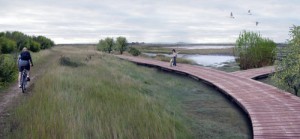Sixty per cent of UK species in decline, groundbreaking study finds
 UK nature is in trouble – that is the conclusion of a groundbreaking report published today by a coalition of leading conservation and research organisations including the Wildfowl & Wetlands Trust (WWT).
UK nature is in trouble – that is the conclusion of a groundbreaking report published today by a coalition of leading conservation and research organisations including the Wildfowl & Wetlands Trust (WWT).
Scientists working side-by-side from 25 wildlife organisations have compiled a stock take of our native species – the first of its kind in the UK. The report reveals that 60% of the species studied have declined over recent decades. More than one in ten of all the species assessed are under threat of disappearing from our shores altogether.
The State of Nature report will be launched by Sir David Attenborough and UK conservation charities at the Natural History Museum in London this evening (Wednesday, May 22), while simultaneous events will be held in Edinburgh, Cardiff and Belfast.
Sir David Attenborough said: “This groundbreaking report is a stark warning – but it is also a sign of hope.
“For 60 years I have travelled the world exploring the wonders of nature and sharing that wonder with the public. But as a boy my first inspiration came from discovering the UK’s own wildlife.
“Our islands have a rich diversity of habitats which support some truly amazing plants and animals. We should all be proud of the beauty we find on our own doorstep; from bluebells carpeting woodland floors and delicately patterned fritillary butterflies, to the graceful basking shark and the majestic golden eagle soaring over the Scottish mountains.
“This report shows that our species are in trouble, with many declining at a worrying rate. However, we have in this country a network of passionate conservation groups supported by millions of people who love wildlife. The experts have come together today to highlight the amazing nature we have around us and to ensure that it remains here for generations to come.”
Richard Hearn, WWT's Head of Species Monitoring said:
"Wetlands cover just 3% of the UK’s surface but 10% of our species are found there. As well as being home to a wealth of wildlife, the UK’s freshwater habitats regulate water flow, disperse pollutants, provide water for our domestic, industrial and agricultural activities, and have immense recreational and cultural value.
"For centuries wetland habitat has been lost or damaged. Wetland species are suffering as a result. Some, such as the European eel are at risk of global extinction. The State of Nature report is a wakeup call to all of us. The state of nature is in decline, the pressures it faces are not going to go away, and our responses need to be more ambitious."
Dr Mark Eaton, a lead author on the report, said:
“This report reveals that the UK’s nature is in trouble - overall we are losing wildlife at an alarming rate.
“These declines are happening across all countries and UK Overseas Territories, habitats and species groups, although it is probably greatest amongst insects, such as our moths, butterflies and beetles. Other once common species like the lesser spotted woodpecker, barbastelle bat and hedgehog are vanishing before our eyes.
“Reliable data on these species goes back just fifty years, at most, but we know that there has been a historical pattern of loss in the UK going back even further. Threats including sweeping habitat loss, changes to the way we manage our countryside, and the more recent impact of climate change, have had a major impact on our wildlife, and they are not going away.
“None of this work would have been possible without the army of volunteer wildlife enthusiasts who spend their spare time surveying species and recording their findings. Our knowledge of nature in the UK would be significantly poorer without these unsung heroes. And that knowledge is the most essential tool that conservationists have.”
 Download the full report
Download the full report
State of Nature - Wales country supplement (Welsh)
State of Nature - Wales country supplement (English)
State of Nature - Scotland country supplement
State of Nature - Northern Ireland country supplement
State of Nature - England country supplement
Wetlands in the State of Nature report

Freshwater and wetlands
“Water is the driving force of all nature” – Leonardo da Vinci
· 57% of freshwater and wetland species for which we have sufficient data have declined, and 28% have declined strongly.
· Wetlands occupy just 3% of the UK’s surface but support around 10% of our species
· Many characteristic freshwater species have declined significantly over the last 50 years, including the Atlantic salmon, water vole and the aquatic plant frogbit.
· One in ten species of freshwater and wetland plants assessed are on recent national Red Lists.
· Some wetland species, such as the European eel and freshwater pearl mussel, are threatened with global extinction.
· The 19th century ended with the extinction of the marsh fleawort due to drainage of the East Anglian Fens – it was just one of many species to suffer from the loss of wetlands.
· An estimated 1,000 sq km of wetlands were drained annually between 1840 and 1880.
· Birds such as the bittern have benefited from habitat creation and restoration work.
· Thanks to local reintroduction schemes and action to reduce river pollution, otters have made a comeback.
· As well as being home to a wealth of wildlife, the UK’s freshwater habitats regulate the flow of water, disperse pollutants, provide water for our domestic, industrial and agricultural activities, and have immense recreational and cultural value.
What factors affect wetland wildlife?
· Wetland loss - Many rivers have lost their natural banks and meanders, and ancient wetlands have been drained. 227,000 ponds were lost on farms between 1945 and 1998
· Water pollution - The glutinous snail was found in clean unpolluted lakes, ponds and ditches. It now survives in just one site in Wales and was declared extinct in England in 2010
· Lack of active management - Without active management, such as grazing and cutting, fens, reedbeds and other early successional habitats will turn to scrub and woodland.
· Water Abstraction - This is implicated in the decline of fen and chalk stream quality: 15% of river catchments are over-abstracted. This may also be responsible for the extinction of the pool frog from its last UK site.
· Climate change - The range of the Arctic char is contracting in the UK as a result of increasing water temperatures. Dragonflies are expanding northwards and colonising from the continent
· Non-native species and introduced diseases - White-clawed crayfish have been eliminated from large parts of southern Britain by crayfish plague
· Creation of new wetland habitat - New habitat has been created following mineral extraction, as well as through direct reedbed and wetland restoration. Many freshwater birds, including tufted ducks, bitterns and marsh harriers have benefited.

Coast and wetlands
· Of the 682 coastal species for which we have trends, 60% have declined and 29% have declined strongly.
· 13% of coastal plant species are regarded as threatened with extinction in the UK.
· Habitats such as saltmarsh support internationally important bird and invertebrate populations.
· Huge areas of coastal habitat have been lost or damaged in recent history, as a result of coastal development, cliff stabilisation and changes to agricultural practices.
